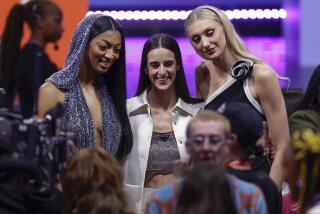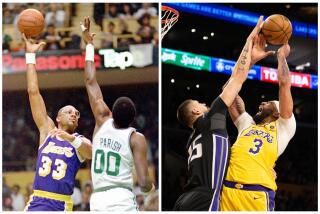Kareem Realizes Importance of Being Kareem : Laker Center Signs Up for Two More Years and He Intends to Enjoy Them
- Share via
WASHINGTON — Kareem Abdul-Jabbar is like a ship that has been on a perilous journey. Not merely afloat, this ship is heading strong toward port, its streamers rippling. It has some distance to go, but it’s coming in with all its power and a new glory. What a finish!
Less than two weeks ago, the Lakers punctuated their championship season by signing the ever-productive, 7-foot 2-inch Abdul-Jabbar to an unprecedented contract--$5 million for two seasons, including $3 million for 1988-89. By then, he’ll be 42 years old; nobody has lived that long--20 seasons--in the National Basketball Assn. He’s the NBA equivalent of a 19th-Century survivor who on every winter birthday sticks his foot into the Atlantic.
He’s become as charming a story, too. By the time most hard-to-approach athletes mellow, they’re long gone--being gone, if not forgotten, helps the mellowing. With Abdul-Jabbar, he’s been playing so long, throwing what looks to be an eternal skyhook, that events have changed his view of life as a burden. If this were a tabloid seen in supermarkets, the headline might be, “Kareem Chills Out.”
“I don’t see the burden as such a problem--the burden has always been there,” he said during a visit to Washington this week. “But I can enjoy what I’ve achieved now instead of resenting the fact that I had the burden.
“I think it’s been said that my inability to enjoy my achievements has made it impossible for people to enjoy me. Because I’m having all this success and I have a scowl on my face, and nothing to say, just very inaccessible, standoffish.
“And that’s changed. And I think I’ve benefited from it, and people who’ve appreciated me as an athlete, they like what they see even more.”
The burden of being Abdul-Jabbar always seemed as large and ominous as himself. As a shy, gangly adolescent growing up in New York City, he was the focus of his high school team; he was expected to be more mature than he was--he was unhappy. At UCLA, he again was the reluctant focus--of three national championship teams. He was criticized for refusing to represent the United States in the 1968 Olympics.
Off court, he put himself into the hands of Hamaas Abdul-Khaalis, who taught him the tenets of Islam. Later, he became estranged from Abdul-Khaalis over their views of Islam. In 1973, Abdul-Khaalis’ family was murdered by Black Muslims in the 16th Street NW house that had been bought by Abdul-Jabbar. In 1977, Abdul-Khaalis and others took over three buildings in Washington. The last time Abdul-Jabbar saw Abdul-Khaalis he was in jail.
In 1983, Abdul-Jabbar’s Southern California mansion burned to the ground. “I lost everything I owned. All I had after that fire--I was on a road trip--was what I had in my suitcases.
“I had always seen myself as not being materialistic, and that was quite a test. I learned a lot about myself. I saw that I lost some things, but things don’t make your life wonderful. Nobody had gotten hurt.” The flames forced the woman he used to live with, Cheryl Pistono, to escape through a window with their 2-year-old son Amir. (A bachelor now, he has three other children from his earlier marriage). It was Pistono who had “challenged” him to view life differently, which prompted his 1984 autobiography, “Giant Steps.”
“I think writing it really helped me accept myself,” he said, “because I had always assumed that people didn’t like me or that people didn’t understand me. I had to come to the realization that I was a big part of that; I could change that. And after telling everybody all of my sins and indiscretions, I still had fans out there. That let me know people can accept me with all the bumps and blemishes. At that point, it made it a lot easier to open up to the press.”
Pistono helped him mend his relationship with his parents--they are now living with him temporarily while relocating in California--and turned him on to his public. “These people like you,” she told him. He began signing autographs, giving interviews, smiling. He can smile almost as broadly as teammate Magic Johnson; while Johnson has dabbled with an Abdul-Jabbar-like hook shot that came to fruition in Boston with a winning shot in the last seconds of the championship series’ Game 4, Abdul-Jabbar seems to have observed the width of Johnson’s smile.
“She saw what was being written about me and she knew me and she knew they didn’t add up,” Abdul-Jabbar said. “She just challenged me to try to do something about it because she said it was in my hands to change it. . . . It was more adversarial than anything else. And it didn’t have to be. Once I saw that, I changed my attitude, and things got a lot better.”
“It seems foolish that it took me 30 years to consider it,” Abdul-Jabbar wrote in his book, “but I had been pretty self-absorbed in my little niche. . . . I started looking at faces in the crowd and realizing that there could be lots of friends up there. . . . “
Compared with his off-court life, playing has been easier. He might make it look easy, but he’s been able to do that only by sustaining superb physical condition. It has made him virtually injury-free. He does cardiovascular training, strength training and stretching--yoga.
“I don’t think I’d be playing if it wasn’t for that,” he said. Wearing a double-breasted pin-striped suit, he was starting a day in which he’d be promoting Los Angeles, specifically, explaining the benefits of the L.A. Convention Center to association executives. Momentarily, he was animated about the effect of yoga classes on his career, calling it “crucial.”
He is almost tireless. “In fact, I think I get less tired. I think my conditioning now is the best that it’s been in my life, because I know what I’m doing. That, and experience, offsets the fact that I’m getting older.” In another sense, his legs carried him to this season’s crossroads. The 1985 championship team had been his team, but this one was Johnson’s. He happily acknowledged the passing of the mantle.
“(Laker Coach) Pat Riley decided that we were too predictable as a team. I was the primary focus and the last resort. The loss we had last year to Houston in the playoffs really underlined that. So he approached me and said that he was going to try to vary the offense and let Earvin Johnson be the primary focus, since he had the ball all the time and that was his job.”
Abdul-Jabbar sounded as formal and dignified as his former UCLA coach, John Wooden; Abdul-Jabbar called him “quite an example to live up to.” Wooden always referred to Abdul-Jabbar, then Lew Alcindor, as “Lewis.” Abdul-Jabbar calls Magic “Earvin.”
“He (Riley) just really defined my role as being an important part of the offense, not the primary focus,” Abdul-Jabbar said. And he wanted good defensive play and rebounding. I figured it was worth a try.”
Statistically, he and Johnson did well last year against Houston “but it didn’t enable the other guys to do what they had to do. This year, we spread everything around, told everybody to go all out all the time, and got a much better effort across the board.”
Of Johnson’s emergence, Abdul-Jabbar said, “It’s not a thing where I’m going to get jealous or say that I’ve lost my stature. I know I’m important to the team.”
The Lakers’ championship feeling this year was “more low key” than in 1985. “It had to do with the fact that we worked very hard for it all year and we expected to win it. It wasn’t like we were surprised.”
It was maybe the fastest-breaking team ever, yet with an ageless wonder. Abdul-Jabbar had been well-established in the game before some of his teammates were born. “It’s funny. There’s definitely, at times, a generation gap. I get along well with all my teammates. We don’t have any problems. As for topics of conversation, stuff like that, when I was born Truman was president, and those guys relate to him like (to) Abe Lincoln.”
He’s optimistic about performing well for two more years. “You can stay injury-free if you’re prepared. It’s the mental aspects of the game that really tear you down. The little things that come with the travel can really wear you out.” But he works at regarding each game the same--be it against a tail-ender in the dead of winter or Boston in the spring. “I just try to have a professional attitude. I don’t try to get ‘up’ for every game. I try to be prepared for all the games, and keep that state of preparation constant. It’s a lot easier to work from that basis than saying, oh, we’re going to play so-and-so, I’ve got to get crazy for it.”
Asked for his appraisal of Larry Bird and his reaction to Isiah Thomas’ remark that “if (Bird) was black, he’d be just another good player”--Thomas later said he wasn’t being serious--Abdul-Jabbar called Bird “an extraordinary basketball player--he’s got all types of capabilities and he has a great work ethic. . . . I won’t get into a debate as to who is the best (forward), but he’s got to be at the top of the heap. . . . With the black-white issue, I think the emotions got involved there for a minute, and Isiah made a faux pas . Because Isiah’s not a racist. I don’t think that he meant what he said in terms of trying to tear down Larry Bird because he is white. But it was made to seem that way.
“I think the bigger issue is something that is real. A lot of times white players are thought of to be hard-working and they got where they are because they are hard-working and dedicated. And black players are made to seem, they use the word ‘athlete,’ and it’s like black players do not work to develop their talent or put in all the dues that the white players have. . . . Stereotypes do exist, and sometimes they are negative.”
Abdul-Jabbar may be the best example of a hard-working black athlete. How could he play if he didn’t keep himself conditioned? “I couldn’t,” he said. “It’s becoming more and more of a muscle game.”
Of his $55-million lawsuit against a former business manager, Thomas Collins, accusing Collins of mismanagement that left him financially strapped, Abdul-Jabbar said he “can’t go into it because of the litigation involved.” He said he wasn’t playing because he needed the money, but it was clear he’d been through difficult times financially. “I have not gone under, financially,” he said, “and it’s not anticipated. . . . We had some hard times, but I’ve survived them and, hopefully, I will continue to be above water.”
About his Telly Savalas look late in the playoffs: It’s not permanent, not yet, anyway.
“My barber said, well, it’s summertime.” His hair is coming back, although “it’s not that much difference if I let it grow in or not.”
He’s 40, after all.
More to Read
All things Lakers, all the time.
Get all the Lakers news you need in Dan Woike's weekly newsletter.
You may occasionally receive promotional content from the Los Angeles Times.






